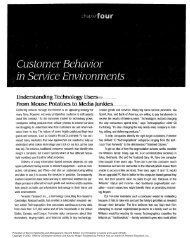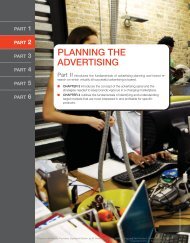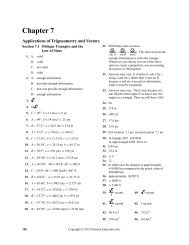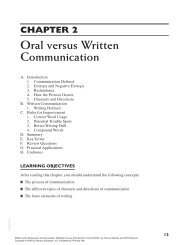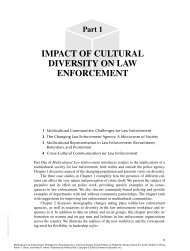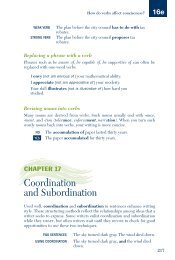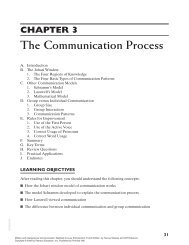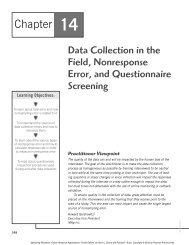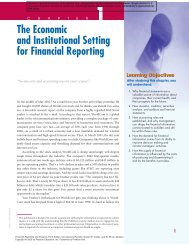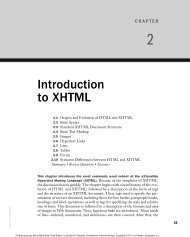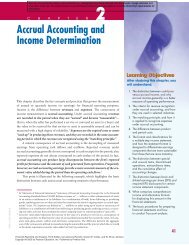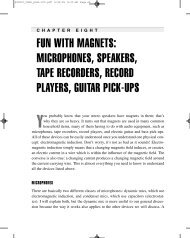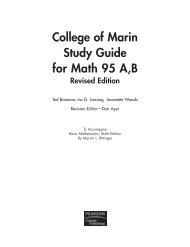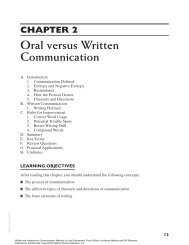Chapter 3 - Pearson Learning Solutions
Chapter 3 - Pearson Learning Solutions
Chapter 3 - Pearson Learning Solutions
You also want an ePaper? Increase the reach of your titles
YUMPU automatically turns print PDFs into web optimized ePapers that Google loves.
Case 3-1 Continued (refer to page 74)The United States and South Korea Sign a Free Trade Agreement:The AssignmentTrade deals require all parties to make concessions, and thenegotiations between the United States and South Korea are acase in point. American beef exports plunged after an outbreak ofBSE (mad-cow disease) in 2003. Before the mad cow scare, theAsian nation was the third-largest market for U.S. beef exports. Inthe spring of 2008, a few weeks after taking office, President LeeMyung-bak decided to lift a ban on U.S. beef; in return, the UnitedStates agreed to exclude South Korea’s rice industry from the tradeagreement.Why? Rice represents about half of South Korea’s agriculturaloutput; a high import tariff means that local rice farmers cancharge much higher prices for their crops than farmers in otherrice-producing nations such as China. Even though they pay up tothree times more for rice than consumers in other Asian countries,many Koreans sympathize with the farmers’ concerns; domesticrice production is a source of pride and a symbol of self-sufficiency.As one activist noted, “It is a right for a country to feed its ownpeople and a right for a country to produce its own food.”After President Lee’s decision was made public, news reportssuggested that mad cow disease could still be present in U.S.herds. Opposition politicians from the United Democratic Party,whose candidate was defeated in the most recent presidentialelection, took advantage of the negative publicity to suggest thatMr. Lee had caved in to demands by American trade negotiators.The rumors fueled a backlash that included rumors that Americanconsumers don’t eat the type of beef that is exported and thatconsumer products such as mascara contain beef by-products andcould be tainted. In May 2008, thousands of people gathered inSeoul to protest.For U.S. President George W. Bush, the trade pact with SouthKorea was an important political victory. Suspicion and doubt abouttrade and globalization was growing among CongressionalDemocrats. Proposed trade pacts with Colombia and Panama hadbeen given a cool reception. Although the accord with South Koreawas concluded in April 2007, it still had to be ratified by lawmakersin both countries. In 2009, a South Korean parliamentary committeeapproved the FTA; the U.S. Congress was scheduled to act on themeasure in 2009 as well. However, Ford, Chrysler, and the UnitedAuto Workers opposed the deal. Hyundai and Kia, the stars ofKorea’s auto industry, were enjoying great success in the UnitedStates despite the recession. Overall sales of both foreign anddomestic cars were down by nearly forty percent in the U.S. market.By contrast, sales for Hyundai and Kia were only down 3.6 percent.Meanwhile, South Korea was also pursuing a trade agreementwith the EU. Agriculture was not a key issue in the negotiations;however, regulations that protect Korea’s auto industry needed to beaddressed. Some observers have suggested that the backlash againstKorea’s trade accord with the United States would spill over andaffect Seoul’s negotiations with Brussels. As Richard Baldwin, aprofessor at the Graduate Institute of International Studies inGeneva, noted, “This shows that the idea that regionalism is easyand multilateralism is hard has been massively overblown.”Case 3-1 Discussion Questions1. When a trade deal is passed, there are winners and losers.Who stands to win if the U.S.-Korea free trade agreement isratified? Who stands to lose?2. Trade issues were central to the 2008 U.S. presidentialcampaign. In a telephone survey conducted in April 2008,48 percent of respondents indicated that free trade agreementshad a negative impact on the United States. Thirty-fivepercent said FTAs were a “good thing”; 17 percent answered,“Don’t know.”Then-Senator Barack Obama, the Democratic nominee,pledged that, as president, he would renegotiate the NorthAmerican Free Trade Agreement. He called for enforceablelabor and environmental standards that were not included inthe original agreement. Senator Obama also opposed theproposed new FTA with Colombia. In one campaign stop,Senator Obama said, “I think we should use the hammer of apotential opt-out as leverage to ensure that we actually getlabor and environmental standards enforced.”Greg Somers, a Canadian lawyer specializing in internationaltrade, takes exception with Senator Obama’s position.“What [Obama} is proposing would be far too intrusive onthe sovereignty of the laws of a country. That’s not the job ofa trade deal,” he said. Senator John McCain, Obama’sRepublican opponent, had this response: “You know whatthat message sends? That no agreement is sacred if someonedeclares that as president of the United States they wouldunilaterally renegotiate it.” 25Which candidate’s views on trade correspond most closelyto yours?Sources: Chris Woodyard, “Cars Hold Up S. Korean Trade Deal,” USAToday (May 13, 2009), p. 3B; Alan Beattie, “Hard Bargains,” FinancialTimes (June 17, 2008), p. 9; Evan Ramstad, “Korea’s Beef with the U.S.,”The Wall Street Journal (June 6, 2008), p. A11; Evan Ramstad and JulieYang, “South Korea Answers Uproar on U.S. Beef,” The Wall StreetJournal (May 3/4, 2008), p. A8; Choe Sang-hun, “U.S. and South KoreaAgree to Sweeping Trade Deal,” The New York Times (April 3, 2007),pp. C1, C8; Evan Ramstad, “Korea Trade Focus: Cars,” The Wall StreetJournal (March 29, 2007), p. A8; Evan Ramstad, “South Korea Ready toOpen Up,” The Wall Street Journal (March 28, 2007), p. A6.25 Amy Chozick, “Trade Stance Weighs on Obama’s Plan to StrengthenForeign Ties,” The Wall Street Journal (July 9, 2008), p. A6.000200010270740623103Global Marketing, Sixth Edition, by Warren J. Keegan and Mark C. Green. Copyright © 2011 by Warren J. Keegan. Published by Prentice Hall.



